Photographs: Vivek Prakash/Reuters Swaraj Baggonkar in Mumbai
On August 3, Ratan Tata addressed the shareholders of Indian Hotels Company, the country's oldest and second-largest hotels company, for the final time as their chairman.
Though events like this are marked with nostalgia and thanksgiving, the highlight of Tata's speech was his justification of the of the investment of over Rs 1,000 crore (Rs 10 billion) the company had made in phases in Orient-Express Hotels - the Bermuda-based hospitality company.
"I think the opportunity to do something strategic together is something we should be looking at," Tata, who retires this December, told shareholders.
Orient-Express is not new on Tata's wish list. In September 2007, Indian Hotels had acquired a 10 per cent stake in the company for $211.28 million. Two months later, it raised the stake to 11.5 per cent.
The intention was clear right from the beginning: a partnership. Indian Hotels wrote to Orient-Express exploring the idea, but Orient-Express's then CEO, Paul White, refused saying "any association of our luxury brands and properties with your brands and properties would result in a reduction of our brands and of our business and would likely lead to erosion."
Incensed, R K Krishna Kumar, the vice-chairman of Indian Hotels and a trusted lieutenant of Tata, shot back, terming it "highly misinformed and unduly aggressive" and asked for an apology.
It never came.
...
Why Tatas want to acquire Orient-Express?
Image: Orient Express Hotel.Photographs: Courtesy, Orient Express
That's where things came to rest. In between, there was a rights issue which Indian Hotels didn't subscribe to and consequently its stake in Orient-Express fell to 6.9 per cent.
Indian Hotels had bought the shares at an average price of $42 per share; the price since then has fallen to $11.3 on NYSE - an erosion of 73 per cent in five years.
"If something strategic happens, I hope we can look back and say that we hung in there for a long period of time and it paid off. If we were to write off the investment we have made then there at some stage will be a view of impairment," Tata had told the shareholders in August.
While Tata was answering queries raised by the Indian Hotels shareholders, a team led by Krishna Kumar was preparing for a crucial meeting with the officials of Orient-Express on August 15.
On that day, Krishna Kumar met Orient-Express's interim chief executive, Philip Mengel, to discuss the possibility of a global strategic alliance. Given its stern response of 2007, the feelers from Orient-Express this time came as a pleasant surprise: The company, Krishna Kumar and his team were told, might be interested in exploring areas where the two could collaborate.
However, Orient-Express solicited no additional equity investment by Indian Hotels.
...
Why Tatas want to acquire Orient-Express?
Image: Orient Express hotel.Photographs: Courtesy, Orient Express
Indian Hotels perhaps knew that buying the company through new shares would be difficult. Months before the August meeting, the company had held a series of discussions with investors and other interested parties to explore a potential transaction involving Orient-Express.
The talks, which started in early 2012, bore no fruit; but Indian Hotels had no plans of giving up. In June, Italian private equity and venture capital firm Montezemolo & Partners SGR, headed by Luca Cordero di Montezemolo, an old friend of Tata and the chairman of Ferrari, was approached with a similar proposal.
Montezemolo turned down the offer initially but came round in September. The two companies decided jointly to acquire all outstanding shares of Orient-Express.
At various times throughout this period, Indian Hotels consulted White, the former chief executive of Orient-Express who had rebuffed the 2007 overtures, regarding the potential acquisition.
After several rounds of discussions with partners, investors, stakeholders, consultants and even the former chairman of the board of Orient-Express, Indian Hotels put a formal but unsolicited bid to acquire the company earlier this month.
Indian Hotels has offered $12.63 per share to the shareholders of Orient-Express in addition to buying out its debt of $530 million, thereby giving the company an enterprise value of $1.86 billion (over Rs 9,600 crore).
It has also hinted that it is open to making an improved offer.
...
Why Tatas want to acquire Orient-Express?
Image: Orient Express hotel.Photographs: Courtesy, Orient Express
What explains Indian Hotels' renewed interest in Orient-Express?
"There is a great strategic opportunity for us, although there is nothing we can say or do. But, if you look at that company, it is very similar to Indian Hotels in the sense it has iconic properties in various countries. We are two companies which are very similar in search of properties," Tata had said at the Indian Hotels annual general meeting.
Actually, Indian Hotels' footprint will expand considerably from 110 properties at present (mostly in India) if it gets hold of Orient-Express.
Apart from 36 hotels, six tourist trains, including the legendary Venice Simplon-Orient-Express in Europe, the Eastern & Oriental Express in Southeast Asia and The Royal Scotsman, luxury cruises and barges in Myanmar and France, and a famous restaurant in New York called 21 Club, the company also partly owns and manages PeruRail in Peru, which operates, among other routes, the Cuzco-Machu Picchu train services.
A large international presence will hedge its risks in India; at present, more than 70 per cent of the company's turnover comes from India. (The international business is yet to generate profits.) It has opened a Taj hotel in Morocco and has signed some management contracts in China.
...
Why Tatas want to acquire Orient-Express?
Image: Indian Hotels will get a presence at the high-end sector.Photographs: Courtesy, Ritz Carlton
Global hotel chains like Four Seasons and Starwood have a wide range of brands in their portfolios. Indian Hotels has a four-brand architecture right now: Ginger at the bottom, Taj at the top, and Gateway and Vivanta by Taj in between.
Orient-Express strengthens its presence at the top. A look at Indian Hotels' last overseas acquisitions, The Pierre in New York and the Ritz Carlton in Boston, shows how it is strengthening its presence at the top.
"Orient-Express's acquisition, if it happens, may give Indian Hotels ready access to a high-end customer base which could have synergies with its international and even domestic Indian portfolio," J P Morgan said in a recent report.
Akshay Kulkarni, regional director (South and Southeast Asia), Cushman and Wakefield, adds: "Indian Hotels will benefit if it comes under an international brand. This is a great way for the company to move forward. For Orient- Express, too, it will create a separate feeder market in India besides the cash flows from it."
Analysts also say the Orient-Express buy will provide the right push for Indian Hotels in terms of brand exposure and revenue, just like the buyouts of Tetley by Tata Global Beverages and Jaguar and Land Rover by Tata Motors.
...
Why Tatas want to acquire Orient-Express?
Image: A model poses with a Jaguar XF in New Delhi.Photographs: Adnan Abidi/Reuters
But can Indian Hotels swallow Orient-Express? Orient-Express is, after all, bigger than Indian Hotels in turnover and market value. That doesn't deter Indian Hotels.
It has a debt of Rs 3,800 crore (Rs 38 billion) on its books, but it has comfortable debt/equity of 1.3. And, the company seems to be in the mood to conserve cash for the buyout. Senior company officials have been quoted in recent news reports saying the company is taking a "momentary pause" in its capital expenditure.
Also, a large chunk of the Orient-Express shares is concentrated in a few hands. The top-10 institutions own 54.1 per cent of the company, and the top-10 funds own 20.4 per cent.
All told, Orient-Express is owned 88 per cent by institutions and funds. So, there is a small circle of investors that the Indian Hotels team needs to negotiate with. On the other hand, these are investors who will bargain hard for maximum returns on their investments.
That could be an interesting tussle because Indian Hotels, too, drives a hard bargain and is seldom known to overpay. Thus, while Sahara paid $570 million for New York's Plaza Hotel (282 rooms and 152 private condos) and $756 million for Grosvenor House (494 rooms) in London, Indian Hotels scooped up The Pierre (189 rooms) for just $50 million.
Meanwhile, Indian Hotels has promised that it will allow Orient-Express to operate independently, the way it operates right now. The difference between 2007 and now is that Tata has the example of Jaguar and Land Rover to show - it has been turned around and Tata has not tampered with the brands.

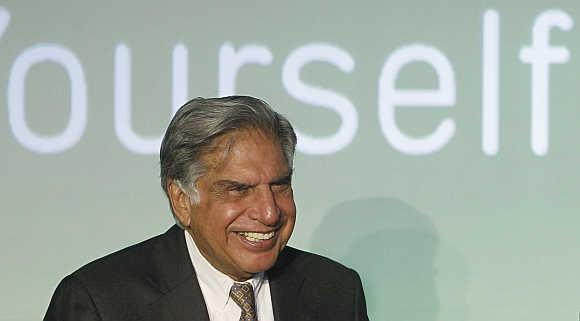
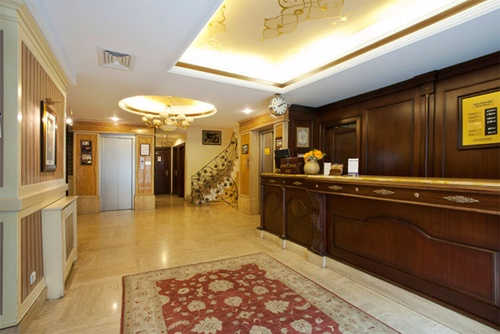
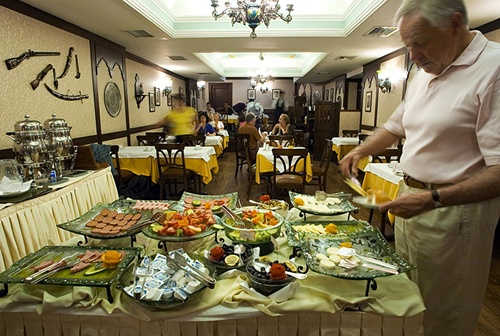
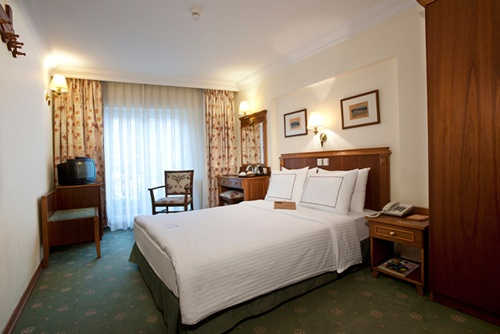
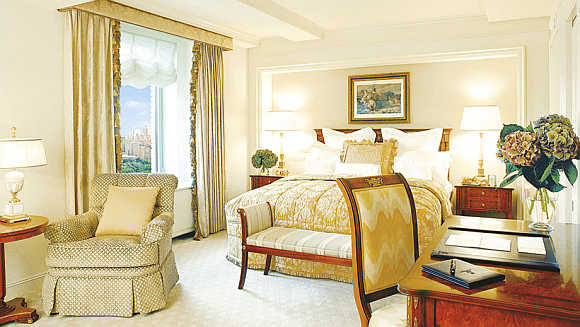


article